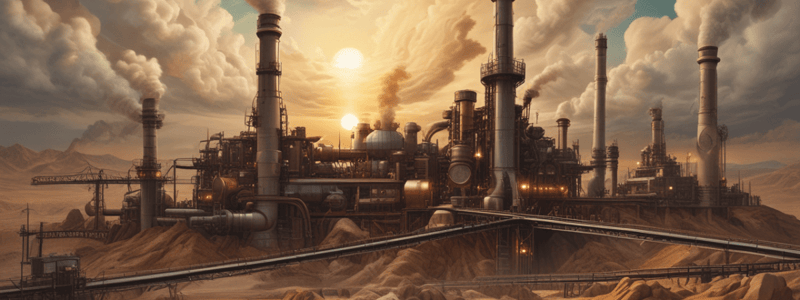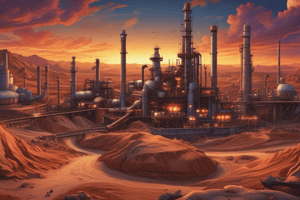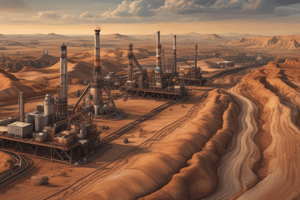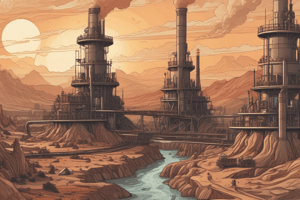Podcast
Questions and Answers
What is a characteristic of fossil fuels that distinguishes them from renewable energy sources?
What is a characteristic of fossil fuels that distinguishes them from renewable energy sources?
- They are expensive
- They are highly concentrated
- They can only be found on land
- They pollute the air and are non-renewable (correct)
What is the process that transforms organic matter into hydrocarbons?
What is the process that transforms organic matter into hydrocarbons?
- Respiration
- Heat and pressure over millions of years (correct)
- Combustion
- Photosynthesis
Where can oil be found?
Where can oil be found?
- All over the world, including both on land and in the ocean (correct)
- Only in ancient sea beds
- Only in the ocean
- Only on land
What is the term for fossil fuels in the form of a gas?
What is the term for fossil fuels in the form of a gas?
What is formed when organic matter is buried in an environment without oxygen?
What is formed when organic matter is buried in an environment without oxygen?
What is a primary consequence of the increased levels of greenhouse gases in the environment?
What is a primary consequence of the increased levels of greenhouse gases in the environment?
What is a common environmental issue associated with the extraction of coal?
What is a common environmental issue associated with the extraction of coal?
What is a characteristic that defines fossil fuels?
What is a characteristic that defines fossil fuels?
What is an environmental concern associated with the transportation of fossil fuels?
What is an environmental concern associated with the transportation of fossil fuels?
What could potentially extend the lifetime of fossil fuels?
What could potentially extend the lifetime of fossil fuels?
What is the main ingredient in natural gas?
What is the main ingredient in natural gas?
What is the primary method of extracting coal in modern times?
What is the primary method of extracting coal in modern times?
What is a major advantage of fossil fuels?
What is a major advantage of fossil fuels?
Which of the following is a major disadvantage of fossil fuels?
Which of the following is a major disadvantage of fossil fuels?
What is the term for fossil fuels being able to be adjusted according to demand?
What is the term for fossil fuels being able to be adjusted according to demand?
Flashcards are hidden until you start studying
Study Notes
Fossil Fuels Definition
- Fossil fuels are ancient fuels formed from the remains of living organisms, typically mined from underground and hundreds of millions of years old.
- Examples include coal, oil, and natural gas.
Formation of Fossil Fuels
- Fossil fuels form when organic matter (plants or algae) is buried in an environment without oxygen.
- The plants are pushed to depths of several miles within Earth's crust, where pressure and heat transform them.
- After millions of years, what is left are hydrocarbons, which are long chains of carbon atoms surrounded by hydrogen.
Characteristics of Fossil Fuels
- Fossil fuels release large amounts of stored energy when burned.
- They unite with oxygen and transform into carbon dioxide and water molecules.
Types of Fossil Fuels
Oil
- Oil is a liquid fossil fuel, often found in ancient sea beds where large amounts of organic matter were deposited and buried.
- Extraction of oil requires drilling into underground deposits, where pressure from overlying rock formations can force the liquid to the surface.
- Crude oil is processed and separated into various fuels according to their weight, including gasoline, jet fuel, diesel fuel, and home heating oil.
Natural Gas
- Natural gas is a fossil fuel found in underground rock formations, including shale, sandstone, and coal seams.
- The main ingredient in natural gas is methane, the smallest hydrocarbon.
- Natural gas is often mined on land using large, steerable drills and is used in power plants to produce electricity.
Coal
- Coal is a black, sedimentary rock formed from the remains of ancient river mouths (plant matter).
- Underground coal reserves exist on every continent.
- Coal is extracted through open pit mining and strip mining, and is burned in power plants or as part of various industries like metal production.
Advantages of Fossil Fuels
- High energy density, releasing large amounts of energy when burned.
- Low cost, due to their ubiquity and easy extraction.
- Abundant, with large deposits available in many areas of the world.
- Dispatchable, meaning power sources can be adjusted according to demand.
Disadvantages of Fossil Fuels
- Air pollution, producing carbon dioxide, carbon monoxide, nitrogen oxides, sulfur dioxide, and volatile organic compounds.
- Climate change, as burning fossil fuels produces greenhouse gases, leading to a global increase in temperatures.
- Water pollution, including runoff from coal mines, leaks in oil pipelines, and toxic fluids leftover from fracking.
- Acid rain, caused by the high sulfur content in coal, leading to acidic rain that can damage the environment.
- Transportation issues, such as maritime oil spills and escaped methane from natural gas pipelines.
- Non-renewable, meaning they will not be renewed during human lifetimes, and will eventually become scarcer, more difficult to extract, and more expensive.
Studying That Suits You
Use AI to generate personalized quizzes and flashcards to suit your learning preferences.




